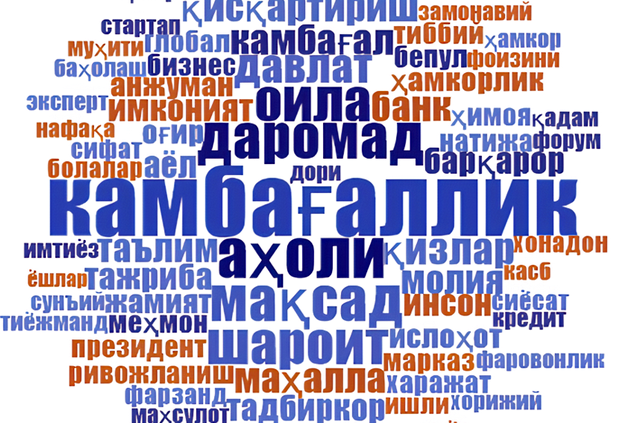
CERR Presented a Linguistic Analysis of the President of Uzbekistan’s Speech at the III International Forum on Poverty Reduction
CERR Presented a Linguistic Analysis of the President of Uzbekistan’s Speech at the III International Forum on Poverty Reduction
Tashkent, Uzbekistan (UzDaily.com) — The Center for Economic Research and Reforms (CERR) has prepared a linguistic analysis of the speech delivered by the President of Uzbekistan at the opening of the III International Forum “From Poverty to Prosperity.”
President Shavkat Mirziyoyev’s address was structured around a systematic transition to a comprehensive poverty reduction strategy, supported by concrete results and aimed at achieving sustainable reductions in extreme poverty by 2030.
The analysis, conducted using the original language of the speech, showed that the President used 1,907 words. The most frequently occurring words were “poverty” (28 times), “population” and “new” (17 times each), “income” (15 times), “social,” “conditions,” and “family” (14 times each), “international” (12 times), “person” (11 times), “state” and “services” (10 times each), “girls” (9 times), as well as “bank,” “organization,” and “mahalla” (8 times each).
Particular emphasis in the President’s speech was placed on systemic concepts that guide the direction of reforms.
The repeated use of the phrase “poverty reduction” (10 times) underscores the centrality of this goal in national policy. Repeated expressions such as “low-income family” (7 times) and “women” (6 times) highlight the focus on vulnerable population groups and the priority of their inclusion in socio-economic development.
Mentions of “financial institutions” and “social services” (4 times each) reflect the integration of the national agenda into the international context and reliance on global partnerships. Phrases such as “New Uzbekistan” and “international finance” (3 times each) link the country’s internal identity with external support for reforms.
In three-word constructions, phrases defining temporal frameworks and strategic focus predominated. The phrase “this year” (5 times) emphasizes tying reforms to specific results in the current period. The expression “Sustainable Development Goals” (4 times) links national priorities with the global agenda, situating the reforms within the international context.
Phrases such as “United Nations,” “international financial institutions,” and “in the field of poverty reduction” (3 times each) demonstrate the institutional framework, from the global level to the specific task of reducing poverty. Mentions of “every family,” “guaranteed medical services,” and “at the level of state policy” (2 times each) reflect the targeted nature of measures and the institutionalization of social policy at the highest state level.
The distribution of words by focus areas shows that the President emphasized national experience in poverty reduction (18%), social protection and healthcare issues (14%), and promotion of economic growth and entrepreneurship (14%).
Significant attention was given to global partnerships and the forum itself (13%), highlighting the integration of national initiatives into the international agenda.
Separate emphasis was placed on supporting women (10%) and achieving Sustainable Development Goals (9%), reflecting a strategic understanding of the link between gender inclusion and long-term global priorities. Education and human capital accounted for 8%, while regional infrastructure development comprised 7%.
The closing emphasis was on the fundamental principle of “Inson Qadri” (human dignity) (7%), which the President identified as the basis for all ongoing reforms in the New Uzbekistan.
The President specifically underscored that all reforms in the New Uzbekistan are grounded in the policy of “Inson Qadri” (human dignity), which has become one of the key objectives and benchmarks of the country’s new development strategy.